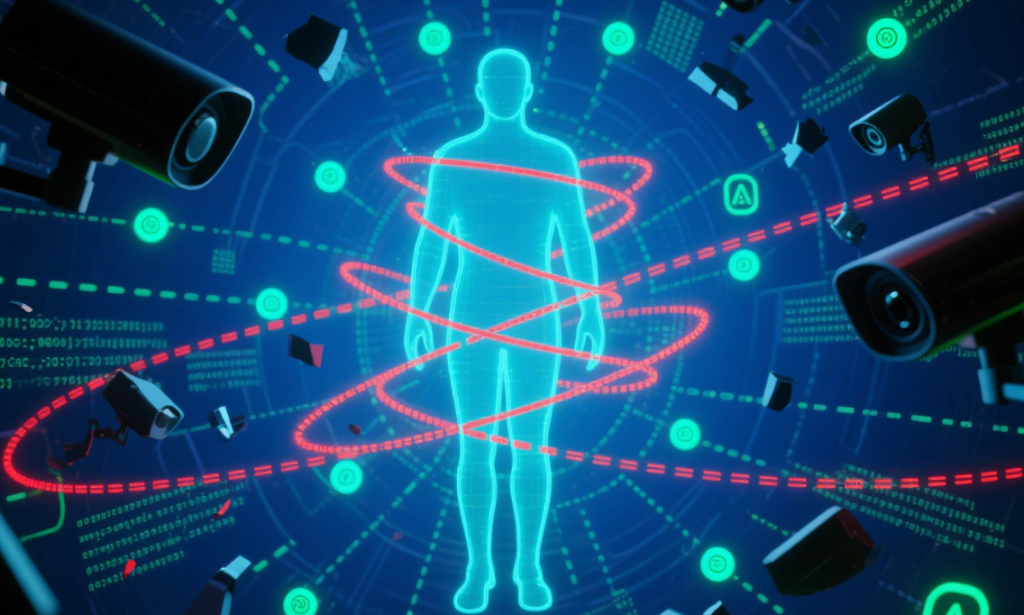
The Myth of Anonymity, the Rise of Blockchain Forensics, and What It Means for the Future of Financial Privacy
When bitcoin.com appeared, it was called the ultimate tool for financial privacy. Meaning it was decentralized, permissionless, and, to a large extent, anonymous by design.
Almost all the early adopters of bitcoin seemed to agree on this: finally, a way to shift funds without banks or governments, or anyone else keeping an eye on it.
The problem, though, is that the story has changed dramatically. After ten years
The world wondered are bitcoins really traceable by law enforcement?
The reply is simultaneously yes and no, giving emphasis on the latter and thereby causing a surprise effect. However, it is not a problem to say it is mostly traceable.
We should check it out.

01
The Origins of the “Anonymous Bitcoin” MythIf we want to know why the myth about anonymous bitcoins exists, we first have to understand how the bitcoin system works.
On a superficial level, Bitcoin appears as if it is anonymous. No real names. No phone numbers. No social security numbers. Just long strings of characters or Bitcoin addresses have been used to send and receive funds.
It is this anonymity that many Bitcoin users believed in.
Nevertheless Bitcoin is not anonymous but pseudonymous.
To put it differently, Bitcoin does not reveal an individual’s identity right away but it hints at everything else. The complete list of transactions that were carried out on the Bitcoin blockchain is open for public viewing and timestamps are provided for every transaction. In addition, the linkage between the transaction and the address is such that one can follow the flow of the particular address.
What if every single transaction you ever made in your bank was published online? Not with your name, but just account numbers. Basically, that is what Bitcoin does.
Initially, it was not that much of a problem. However, the tools had come which could link the details.
02
Enter: Blockchain Forensics
It was around the year of 2014 when the likes of Chainalysis, Elliptic, and CipherTrace began to offer a service that both scared and amazed people: the monitoring of the blockchain.
These organizations created sophisticated programs that are capable of tracing the money trail on Bitcoin’s open ledger. For instance, if a wallet address is associated with the release of ransomware, or the darknet sale of drugs—in such a case, the companies can track all the hops Bitcoin takes after that, sometimes traversing many wallet addresses.
Things were completely different when exchanges began gathering KYC (Know Your Customer) information that included names, residences, and IDs.
Only one link from the wallet to a living person was required by the police, and then, like a spider web, they could trace all the wallets (the one in question, and those related) forward and backward in time.
Bitcoin, by all means, was turned to be the worst privacy tool ever founded.
03
Real-World Examples: How Law Enforcement Tracks Bitcoin
Comparing the scenarios, we shall understand better the ways by which police can track Bitcoin.
A. Silk Road and the Fall of Dread Pirate Roberts
The FBI was able to bring down the Silk Road in 2013, an infamous marketplace on the darknet. More than 144,000 BTC were taken from the agents, and the value of these coins is in the billions of dollars nowadays. Ross Ulbricht, the founder of the site, was also captured.
How had they discovered him?
Among other things, Ulbricht had been discovered because one of his first posts on a forum was a post that was made with an email address that contained his name. From this point, police could sync the server logs with the activity patterns and also the wallet movements.
On the other hand, the Bitcoin aspect was just as necessary. They had a complete picture of how the money moved in and out of Silk Road wallets.
It was all publicly available. All were easily traceable.
B. Colonial Pipeline Ransomware
Back in 2021 the DarkSide ransomware gang, paid with 75 BTC (approximately $4 million at that time) after they made the Colonial Pipeline, a big American oil supplier, completely inoperable.
However, within just a couple of weeks, the FBI managed to snag most of the ransom money back.
How?
They transparently mapped the Bitcoin on the blockchain. A move was made by the perpetrators to split funds into several accounts to cause confusion but the law enforcement officers simply traced the flow till the wallet they had the key for was reached.
C. Welcome to IRS-CI
The IRS Criminal Investigation Division (IRS-CI) might not be on your radar, but it has transformed into one of the most proficient crypto tracing units around the globe.
They have put a lot of money into blockchain monitoring tools and brought in specialists in digital forensics.
If you believe that the IRS couldn’t locate your Bitcoin wallet that you kept hidden in 2017, then you are mistaken.

04
However… What Is The Case With Privacy Coins?
You may be curious to know: “If Bitcoin’s transactions can be tracked, then why don’t people use Monero or Zcash?”
It is indeed a good question.
Privacy coins like Monero (XMR) keep the sender, receiver, and amount of each transaction a secret.
Unlike Bitcoin, the addresses and values in its blockchain are hidden.
Even top-notch forensic tools find it challenging to follow Monero.
Zcash delivers “shielded” transactions that conceal the transaction data, however, not all Zcash transactions are private by default.
During the last several years, privacy cryptocurrency coins such as Monero, Zcash, etc. have become more and more popular among the crypto-community. As a result, the authorities have to deal with big privacy hurdles of different kinds.
The law enforcement admits that privacy coins indeed challenge them to hard work. The IRS implemented a competition in 2020 with a $625,000 prize for whoever found a solution to Monero.
Yet, the outcomes of the work have been small.
The point is: while privacy coins are great for privacy, they have bad liquidity. The acceptance of privacy coins is limited. Most big centralized exchanges are under heavy regulations and that is why they don’t support privacy coins like Monero to be listed.
Furthermore, the very act of using privacy coins might cause suspicion and draw attention to you.
Also, if you suddenly changed all your bitcoins to Monero, it wouldn’t be traceable, but still, it would be suspicions, particularly for the authorities.
05
Mixers, Tumblers, and Other Obfuscation Tactics
Traders who are using crypto obfuscation tools are often compared to the mouse in the cat-and-mouse game of cryptotracing.
One can say that mixers (e.g., Tornado Cash on Ethereum) allow people to mix their money with other people, so the chain of custody is not very traceable. The main idea is that after your coins have passed through a number of different people, it becomes very hard to tell which ones are yours.
Nevertheless, this is not the end of the world.
Actually, the law enforcement has traced numerous mixing services. Some courts have gone even further and claimed that a person can be charged of deliberately trying to hide something juste because that person uses mixers.
In 2022, for example, the US Treasury took measures against Tornado Cash and went as far as arresting one of its developers. Alexey Pertsev got detained in the Netherlands for several months, which sparked a global privacy debate.
Therefore, the question is: are you ready to use such devices that shield your identity, but on the other hand, put you under the spotlight?
06
The Illusion of Privacy—and Why It Still Persists
Why do a lot of people still keep thinking that Bitcoin is untraceable?
In part, it is due to the fact that the interface doesn’t tell the whole story. The names and locations are not visible when you look up a block on a block explorer. There are only numbers.
It looks like it is private. Till you find out that it is not.
But also, crypto has the libertarian spirit ingrained in it. People like to believe that they are financially autonomous. Lack of traceability is just one of the elements of the fantasy.
However, the truth is that:
Bitcoin transparency is the default setting.
That access to your money is for anyone who has the necessary skill set and if the effort is worth it – thus also the police.
07
So What Can You Do?
We should make a point of saying that we are not advocating for doing anything illegal. But if financial privacy is important for you, take a look at the following measure.
Abstain from address recycling. Every time you reuse the address, you expose a greater portion of your operations.
Make use of privacy wallets such as Wasabi and SamOURAI which provide the coinjoin feature.
Do not participate in KYC exchanges if it is not mandatory—that however is getting more difficult.
Be up-to-date with the latest developments. New tools are introduced. Techniques shift. Privacy is never static.
Fully understand the nature of mixers before you use them. They are not only unsecure from a technical point of view, but also risky in terms of law.
The most important thing: it is better to take for granted that anything on the blockchain is there to stay and visible to everyone. Since that is the case.
08
The Future of Crypto Privacy—and Regulation
It’s a new chapter we’re stepping into.
On the one side, the authorities are going for increased monitoring. The FATF (Financial Action Task Force) is forcing nations to embrace the “travel rule” which mandates that exchanges provide information about the users involved in a transaction.
Meanwhile, developers are creating privacy layers of the next generation like zero-knowledge proofs, layer-2 rollups, and multi-party computation.
The war between privacy and regulation is barely beginning.
However, if you are using Bitcoin and think that you are invisible?
You are not.
No longer.
09
Final Thoughts: Traceable Doesn’t Mean Evil—It Just Means Transparent
The expression “Bitcoin is traceable” is often interpreted as a warning. However, in some aspects, it is a characteristic—the feature of the system.
Openess is a deterrent against corruption. It makes the job of the regulators easier. Moreover, it can be a reason for increased trust in the system.
Though at the same time, it also requires you to be cautious.
Bitcoin is not a protection, rather, it is a transparent one.
And law enforcement? They are not looking at it from the other side. They are observing it all the time, through the AI-powered binoculars and with a court order in their hands.
Therefore, next time somebody tells you “Bitcoin is anonymous”, just smile and pass on this article to them.
The reality is different. And much more interesting.
Written by: Tim
Crypto researcher. Privacy advocate. Occasional paranoid.